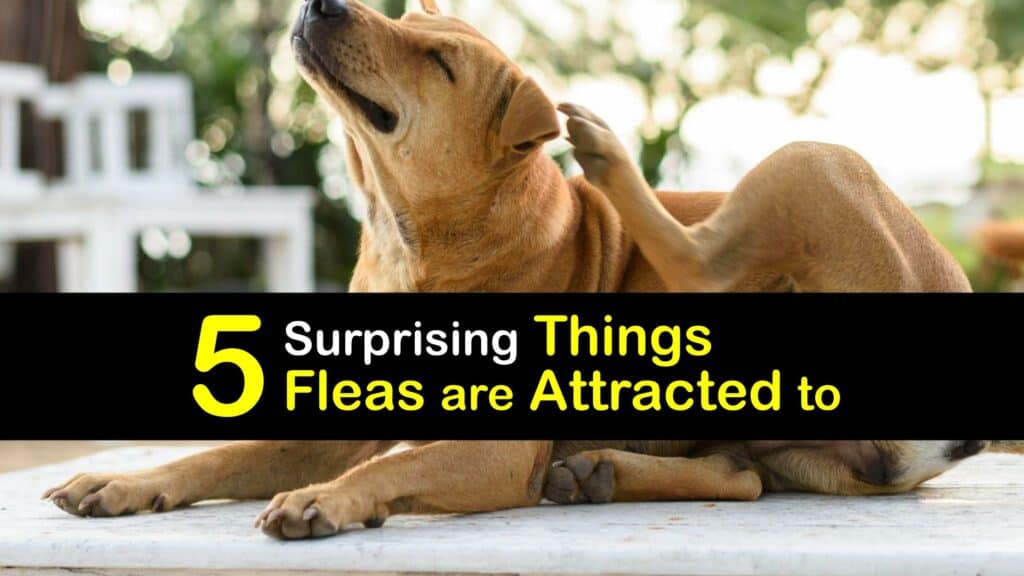What attracts fleas, and why are they so hard to get rid of? Fleas are small, agile, and difficult to eliminate. You could be doing things to attract fleas to your home without even knowing it. Learn some of the most common mistakes people make regarding flea control and find tips to help keep your space flea free.
Fleas are part of an order of blood-sucking parasites that feed from a host to sustain life. Mature fleas are also carriers of disease and are commonly cited as contributing factors to the spread of bubonic plague across Europe. During the bubonic plague, fleas fed on diseased rats, and then, looking for new food sources, the fleas then spread the disease to humans.
Fleas are not only a huge nuisance; they’re dangerous. The female flea lays roughly 50 eggs daily; a single flea very quickly becomes a huge flea problem. Discover the best human flea repellent and plenty of ideas to help you fight fleas while keeping your pets safe and home secure.

What Are Fleas Attracted to?
The best way to prevent fleas is by learning a bit about their habits and preferences. This in-depth guide explores what attracts fleas to humans, pets, and your home. Get the information you need to fight fleas successfully.
Fleas Want to Be Warm
What are fleas attracted to? Insects like adult fleas, bed bugs, and mosquitoes are driven by the need to feed on warm-blooded animals to survive. Fleas are cold-blooded insects; they cannot regulate their body temperature. Mature fleas want to find a warm host and settle down for the duration of their lifespan.

Fleas Love to Live in Carpet
Fleas are the worst house guests; they nest in the carpet, leave flea feces or flea dirt, and are unwilling to leave. Getting fleas out of the carpet requires a little elbow grease and this super-effective DIY flea treatment. Pick up anything on the carpets: pet beds, clothing, fabrics, etc. Next, give the carpet a thorough vacuuming.
To mix the flea powder, get a small container with a perforated lid, like a spice container, and fill it with one part food-grade diatomaceous earth and one part baking soda. Spread the powder across the carpet, leave it for 24 hours, and vacuum. It kills fleas, bed bugs, and many other bugs that may have made a home in your rugs. Repeat as required.
If your dog seems to have attracted all the neighborhood fleas, whip up a homemade dog shampoo for fleas and ticks using apple cider vinegar, water, and a gentle dish soap like Dawn.
What Attracts Fleas to Pets?
When we think of fleas, we probably think about our pets. What attracts fleas to pets? The cat flea or Ctenocephalides felis and the dog flea or Ctenocephalides canis are attracted to the ideal living conditions on your pet’s body – warmth, food, and safety.
Your pet might pick up fleas from pet service places like the groomer, kennels, or dog park. Adult fleas hitch a ride on your pet and begin breeding right away. Fleas mate and lay eggs in your pet’s fur; it doesn’t take long before the flea eggs fall off your pet, and the flea larvae hatch around the house. Flea and tick control is no joke.
Check hot spots like your pet’s bed, kennel, or favorite places to lounge if you suspect a flea infestation. To confirm, look for itchy red flea bites and skin secretions on your pet. Invest in pet-safe flea shampoo, or use a flea comb dipped in fresh lemon juice to repel fleas to control a flea infestation on a dog or cat and stop them from setting nesting on your pet.
What Attracts Fleas to Your Yard?
What are fleas attracted to, and what brings them to the yard? A cluttered yard full of plant debris, stagnant water, or other organic waste attracts all kinds of pests, including wildlife that bring flea hitchhikers.
Any feral wild animal probably carries fleas or ticks into your yard. Raccoons, squirrels, coyotes, and deer are common neighborhood animals in some places and are prone to flea infestations. Pets may then pick fleas up from the grass or interact with wildlife to transfer some of the flea population.
Remove the temptation for wildlife to come into your yard looking for food sources or nest debris; keep your yard clean and tidy. Pick up yard waste quickly, drain stagnant water, and cover your compost pile. Call animal and disease control if you have any concerns about the wildlife around your property.
What Attracts Fleas to Humans?
What attracts fleas to humans? Pulex irritans, or the human flea, want what all parasites want – a warm host with plenty of blood. Many scientists believe fleas are sensitive to movement and carbon dioxide exhalation. Large mammals like humans emit a sizable amount when we breathe, which may cue the flea to leap into action.
Because fleas are wingless, they are powerful jumpers who can leap 150 times their height onto your pant leg. Flea bites appear as red spots, usually around the ankles and feet, and sometimes in clusters of three. Repeated and untreated flea bites can cause an allergic reaction.
Sometimes the best flea salve is a simple, natural home remedy. Treat your flea bite with a cotton ball and apple cider vinegar. Press the wet cotton ball against the flea bite for a second or two, and then move on to the next. If you feel unwell or notice large numbers of bites, consult your healthcare professional.
What attracts fleas? The answer seems obvious once you know a bit about fleas and their habits. All fleas are searching for a warm host. Mature fleas seek mammals exclusively as a food source and are very persistent once they get a foothold.
Prevent fleas by starting with a clean yard. Get rid of standing water, leaf piles, and any other organic waste that might attract a wild animal with fleas to your home. If you notice fleas on your pet, treat it immediately with a flea comb and pet-safe shampoo.
Wash pet bedding and area rugs regularly, and consider setting a flea trap or two out around the house near entry points and pet beds. Flea traps are inexpensive and provide continued protection while you’re busy living your life.

What attracts fleas? If you enjoyed learning these flea facts, share this article with friends on Pinterest or Facebook who are sick of fighting fleas.